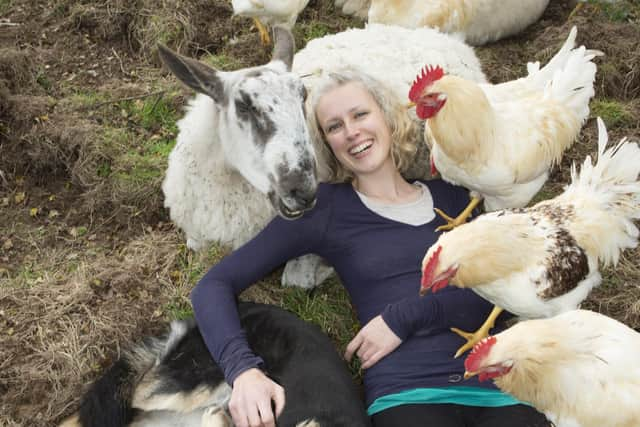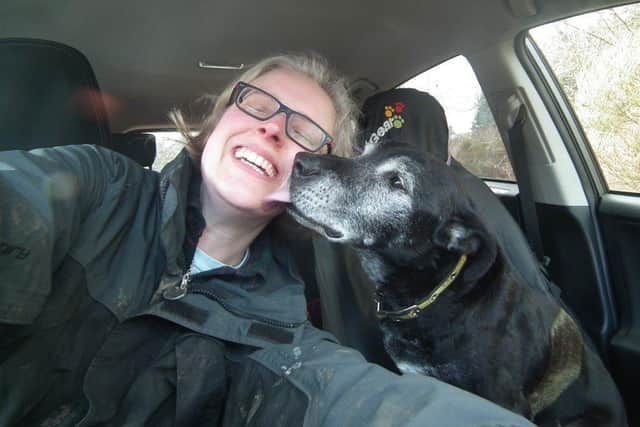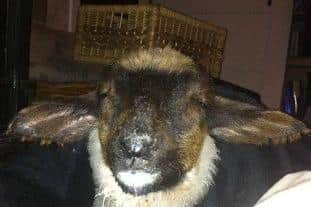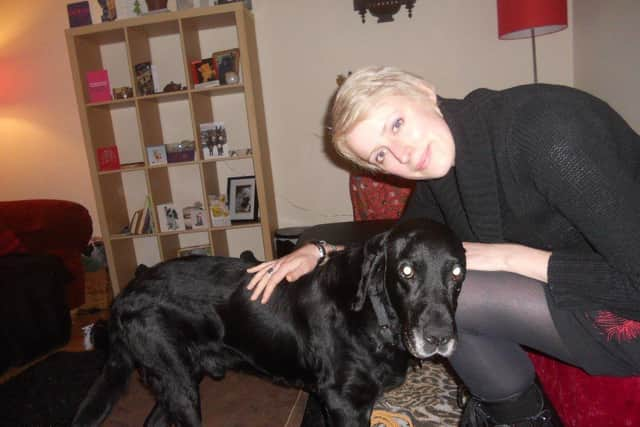Why Alexis Fleming's animal hospice in south-west Scotland is full of life


“He’d wanted for so much - food, a bed, a home – but what he really wanted, what he longed for more than anything else, was love. For someone to notice him, to care about him, to massage his aching body, to hold him and make it better. He’d waited so long for a friend, and despite the years of sadness and loneliness, he was desperate to love someone back.”
This is Alexis Fleming, the force of nature behind The Maggie Fleming Animal Hospice and The Karass Sanctuary near Kirkcudbright, talking about George, an old labrador who had been kept alone in a shed for four years.
Then a dog rescue found him, put him on their website, Fleming collected him, cared for him, and loved him, but George was already dying and after 12 days, was gone.
“He’d been really happy,” she says. “He’d had 12 days of pottering, sniffing and friendship. Twelve nights in a warm bed, in a home with a door. I couldn’t change what he’d gone through before, but right at the end, he’d known 12 days of love,” she says.
George’s story is one of many told with unflinching honesty and humour in Fleming’s new book, No Life Too Small - Love and Loss at the World’s First Animal Hospice, written in the wee small hours while the animals snored, often on scraps of feed bag or in the dark on fence posts. It’s the story of her journey to build up a place where animals and birds are safe and loved, those nearing the end of their life cared for, and those rescued given sanctuary.
George wasn’t the first unloved or abandoned dog Fleming had taken in. That was Maggie, after whom the hospice and sanctuary is named, a skinny, terrified bullmastiff bought on gut instinct from a man who didn’t want her on Christmas Eve. Maggie went on to live a happy life with Alexis and it was her death, unexpectedly at the very end after surgery in a veterinary hospital, that was the spur that led Fleming to set up the first farmed and companion animal hospice in the world.
The Maggie Fleming Animal Hospice and The Karass Sanctuary at Ringliggate, five miles from Kirkcudbright, is now home to 146 animals and birds, many saved from pounds and slaughterhouses. “And seven more chicks arriving tomorrow,” says Fleming, chirpily.
“There are seven dogs - three are house dogs, Benny and Ri who are my house dogs and not really part of the hospice and sanctuary, but are out there every day, and a wee mental ginger Staffie - two cats, four quail, four turkey, 46 cockerels, 68 hens, nine sheep, 10 lambs, six pigs and me and a black cat who lives in the house as well. It’s usually about 140. And then there's some folks that come and go, so you’re probably looking at 160-170.”
At a hospice, death is an everyday word, but with it comes its flipside, life, and Fleming’s tales teem with it. The story starts with Maggie, without whom the hospice would not exist, explains 40-year-old Fleming.
“It was a way of overcoming the guilt I felt because I had promised Maggie I would go back for her after the operation and I never did. I don't still feel like that. I know she knew I loved her and love disnae leave the room when you do, but that initially got me going, to do something to make it bearable and worthwhile.”
It’s clear from the start that with a book about an animal hospice there will be tears, but there are as many laughs as Fleming writes about the animals with whom she shares her adventures, setbacks and triumphs, her move from Aviemore to Galloway as her household increased, and her hopes for the future of the hospice and sanctuary. Not only does she capture their larger than life characters and personalities - Bran who loves to shout about his beloved CAR!, the piglets who stage Extreme Makeover: Home Edition in the kitchen, the inscrutable sheep at once so calm then randomly sprinting up a hill, or “Dickhead, aka Charles, the violent turkey who lies in wait for Fleming. Her many conversations with them leap and bark off the page but the more serious side of the relationships are there too, as they all face up to illness and death, about which Fleming writes with honesty and candour. She holds your hand and makes it OK.


She tells a good yarn too, like the disastrous date when she arrived soaked to the skin because she stopped in a blizzard to rescue a dying lamb on a bridge en route. Her date’s response “you should have just let it die” killed any chance of a second date. Or the time a passerby saw a sheep, a dog and a chicken in her parked car and asked if she had the kitchen sink too - she did.
As we Zoom chat, in the background there are dogs, chickens, sheep, cats, turkeys outside the traditional farmhouse with its four and a half acres, but it’s surprisingly peaceful for such a populous place. There is, however, a swallow singing its heart out next door on the bathroom window ledge, not a resident but a visitor that drops by for a sing song of a morning and it sparks an image of Fleming as Snow White, surrounded by doting birds and animals, closely followed by another of Dr Dolittle, for Fleming does indeed talk to her animals. Often the chat is about stolen Hobnobs or who has been ripping the wallpaper off the kitchen walls (could be piglets, could be chickens), but there are times it takes a more serious turn, when animals are ill or dying.
At those times Fleming falls back on the promise she has made to the animals when they arrive.
“When animals come in I say ‘I promise when you tell me it’s time that you want to leave, I will listen, and we'll make it as nice as we can. And until then, let’s just do the love bit. I don’t think they understand the words, any more than I know what baa means, but it’s a feeling. And even if it doesn’t mean much to them at the time, by the time it’s time for them to die, it does, because by then they feel secure and safe and loved and are trusting me to listen. Then I can take away as much of the stress and trauma from them as I can and they can just say ‘I’m done’ and don’t have to worry about anything else.


“When it comes to the end we all want the same thing. Everyone wants to feel comfortable and safe and to feel that we’re not alone.”
Fleming knows what it’s like to be ill. Five years ago she was given six weeks to live - and before that she went through a time when she was homeless, sleeping in her car and hostels, reaching a physical and mental low where she didn’t know if she wanted to keep living. Finally diagnosed with Crohn’s Disease, an autoimmune disorder of the intestinal tract in which the body attacks itself, which had caused inflammation, scarring and deep ulceration throughout her intestines, as well as an inflammatory arthritis, she faced an uphill battle every day.
“It was so painful I couldn’t stand. I had to crawl along the ground. I knew I was dying.”
The turning point came when things appeared to be at their worst. Given six weeks to live by doctors, with a huge mass in her intestines, she faced more treatment that she didn’t think her body could take.
“I knew that the pharmaceutical route was ending because it was destroying me. I was feeling more ill all the time with the steroids and chemotherapy and the only other thing on offer was an immunomodulator which would knock out my immune system, stop me being around animals and shorten my life. Death, death, death. I knew in my gut that my body didn't need more to deal with, it needed something to heal it.”
Fleming turned to cannabis oil after much research, taking a gamble with her last six weeks. By the time of her next hospital appointment, she knew things had changed.


“I knew it was going to be good news because I wasn’t in excruciating pain anymore. But when you actually see it on an MRI… Apart from finding two old scarred bits, my intestines were completely healed, not just okay, but completely healthy.”
“Cannabis oil is the only thing,” she says. “It gave me my life back and I wasn't expecting that. I couldn’t believe it when they said that big mass had gone. It saved my life. This place is built on it really,” she says.
“l think there's a lot of prejudice - folk think those using cannabis are lying about in a haze. I hope my 20-hour day, which I can only do because of it, dispels that idea.”
Now Fleming is back functioning on four hours sleep a night, doing hard physical labour around the hospice and coping with the emotional strain.
“Given what I throw at it, my body’s holding together pretty well. I'm delighted. I’m really lucky.”
In her darkest times it was the animals that needed her that kept her going, and while it’s obvious what the animals get out of the hospice, Fleming reckons she gets every bit as much back. How does she think they’ve helped her?
“In more ways than I could ever say. OK, sometimes when I'm trying to get out of the house and someone’s standing on my foot and another pees on the floor, or they just want to eat, you’re just like grrrr, they drive you nuts. But we're all like that with our families. When you're having a cuddle with an old man dog that’s never had many cuddles, and he feels king of the world because his wumman loves him, that's a gift to us both. It's lovely to be able to make people feel special and loved. Often the only difference between how they were before and how they are now is my love. It’s changed their life. It's using that love you've got inside to see it in front of you. That makes up for all the nights when you're thinking, at midnight, oh god, a rat hole!, or a mite outbreak or someone dying.
“When you’ve been out 18 hours in a horrible day, stumble in the door soaked to the skin, and there's a massive Staffie smile waiting for you, you cannae no respond to that. It's always a two-way thing. I just love spending time with them. Though I wish they would all go to their bed at night.”
After a year in which everyone’s lost someone, Fleming’s observations about our inability to talk about dying and terminal illness, animal or human, strike a chord.
“We don’t cope with death or grief very well. I wrote the book for that reason as well as to share what I've experienced. It won’t be for everyone, but it’s for anyone who's lost someone, felt grief or faced death, for anybody they've loved.
“Maybe it helps to see there’s another way of accepting death into our lives. If we accept life, we must accept death. In the past 11 days I've said goodbye to six of the folk who were here and there are two more probably terminally ill, a couple of the chickens. Old dogs I've known for two years and I'm having to end their lives in the middle of the night. I've just said goodbye to a lamb. It's acceptance that this is what's happening. I’ve found that being able to face death has lessened its grip on me. Anybody who feels caught in grief, I hope seeing it from another angle might help.”
The hospice is run on a donations-only basis and Fleming doesn’t take a salary or pay anyone. All of the money received goes into the care of the animals. There are volunteers - her dad and Kerry, a neighbour who turned up with sandbags when the house flooded and has been a pal ever since - and small party visits are about to resume now lockdown has lifted.
So far Fleming has raised £400,000 to convert the house and add infrastructure, creating a hospice that is cosy and comfortable, not clinical and cold, and estimates annual running costs at “probably £50,000. I try not to think about it!”
The hope is the book will raise much-needed funds that will enable her to rebuild the hospice and make it more fit for purpose, “maybe get a car that you can put sheep in and I’d like to fix the garden so I could grow my own food and medicine,” she says.
Despite press attention, awards such as community champion in the 2018 Sunday Mail Great Scot Awards and a short documentary called Crannog, which premiered at the Edinburgh International Film Festival, there are those who voice criticism. However, Fleming doesn’t waste her precious time on trolls.
“I don't expect everyone to agree. I get a lot of ‘why’s she not doing it for humans, why aren’t you putting the money to this or that? Usually the first thing you try to ascertain is whether THEY are? It's not for everybody, and that's okay.”
In fact it’s because Fleming is aware of the injustice and inequalities of the world around us, and has faced hard times, that she’s dedicated to making her small corner of it better. And rather than resent the effort and commitment that is required, she’s grateful for it.
“I feel like my life is more rich, because you're always trying to interpret, because it’s all about feelings and emotions with animals. So I feel more fulfilled than I ever have, even though it's taken everything. The world is a kind of heaven but there's so much horror in it that doesnae need to be there. I get that we're gonnae die, I get that we're gonnae get ill, and accidents and gruesome things happen, people are starving and there’s injustice. I just want my own wee bit of it to be not that. The only way I can cope is to do this,” she says.
“Seeing someone come alive because of your love, changes you, stays with you. Every day I go out there, everyone's Okay, the old men (dogs) are lounging in the sun, the collies are playing, everyone's okay. The aim is just to keep everyone content.”
“I cannae run an animal hospice and be surprised when folk die. It’s going to happen. And you cannae be alive without knowing people die. The further away I’ve got from that fear and dread of it, it's easier to get on with the good bits. The love and the life and all that kind of stuff.”
No Life Too Small - Love and Loss at the World’s First Animal Hospice https://www.nolifetoosmall.co.uk/No Life Too Small is released in hardcover, audible and e-book on 8th July 2021 in the UK by Quercus, £16.99.
The Maggie Fleming Animal Hospice and The Karass Sanctuary https://www.themaggiefleminganimalhospice.org.uk/
https://aeon.co/videos/when-it-comes-to-the-end-we-all-want-the-same-things-why-animals-need-a-good-death
